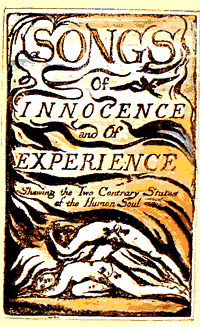
Literary Critic and Poet
 William
Blake:
William
Blake:
Songs of Innocence and Experience
I have always admired Blake's shorter poems, and frequently taught them; but I have never written on Blake because I have felt to be disqualified by my inability to come to terms with some of the prophetic books. These seem to me turgid, boring, jargon-ridden, incomprehensible without the aid of cribs or lifelong study. The most surprising aspect of their failure as poems is that they eschew the very qualities which make Blake such a great poet in his shorter poems and in occasional passages from the longer ones - they are, of all things, prosaic. Poems such as 'The Sick Rose' and 'The Tyger' are as poetic as poems can be, in the sense that they communicate with incredible power and economy by means which are unique to poetry. And it is poetry stripped of all inessentials. There is no clutter, no versified philosophy or myth-making, no self-indulgent rhetoric, no musical or onomatopoeic effects, no display of craftsmanship, no 'poetic' diction, no apparent attempt to 'load every rift with ore' (Keats); just the minimum number of simple words and images designed to slide irresistibly into the mind of the reader and detonate there.
When I began to study poetry fifty years ago a group of Americans called the New Critics were in the ascendant. A popular book representing their method at its best was The Well-Wrought Urn: Studies in the Structure of Poetry, by Cleanth Brooks, published in 1947. These critics developed a type of formal analysis which they tried to pass off as an objective academic discipline, though behind it lay a quasi-religious shared assumption about the relationship of art to life. They believed that art stood in opposition to life, or offered an alternative to life, providing the form and meaning which chaotic life lacked. In art man was in control and could aspire to a degree of perfection impossible in life, could create forms, for example, which would not be subject to time, decay and death. Each poem should aspire to such self-contained perfection, separate from and owing as little as possible to the world outside itself, like a well-wrought urn.
Some poems responded well to this treatment, including poems by such then fashionable poets as Auden, Stevens and Empson. But the works of greater poets such as Donne, Keats, Hopkins or Yeats seemed to me to be reduced by it. It could not handle less formal verse such as Whitman's and Lawrence's. Confronted by simplicity it was dumbstruck. Their concept of a good poem was not mine. As Lawrence said, nature abhors the billiard ball, the perfect-unto-itself sealed monad, the closed system. I did not want poems to be self-contained and self-referential. On the contrary, I wanted them to release their energies into the mind and feelings of the reader, and to relate to as much of the world outside themselves as possible.
The short poems of Blake are like pebbles thrown into a pool, creating ripples which move outwards indefinitely, affecting everything they touch. At their gentlest they are like tendrils caressing the world, at their most violent like bombs smashing to smithereens the false structures of existing beliefs and opinions. Herman Melville said that the writer should say 'No! in thunder' to all the most common and cherished beliefs of his society. Blake can thunder with the best, but he an also say no so quietly and subtly that the reader does not realize quite how much is being subverted.
It seems that some students studying Blake are finding even these short
poems difficult or empty because they have not been taught how to read
poetry. What follows is two essays which can be downloaded free. The first,
on 'Innocence and Experience', explains Blake's use of these terms and
their relationship to each other as 'contraries'; demonstrates from the
poems themselves the deficiencies of innocence as Blake saw it; compares
Blake's views on infancy with those of Wordsworth in his 'Ode: Intimations
of Immortality from recollections of Early Childhood'; indicates how Blake's
ideas were taken up in the twentieth century by D.H.Lawrence and T.S.Eliot,
and their relevance today; and finally places these ideas in the larger
context of Blake's scheme of 'fourfold vision'. The second essay, 'Reading
Blake' offers extended readings of three representative poems from Songs
of Experience, 'The Clod and the Pebble', 'The Sick Rose', and 'The
Tyger'.
Each essay can be downloaded free using either Word or pfd. Just click
on the icon
| 1. | Innocence and Experience | Word | |
| 2. | Reading Blake | Word |